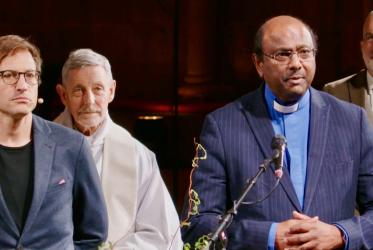What might be termed “an authentic interreligious encounter” is also, more simply put, a question of what it means to belong. Eleven students at the World Council of Churches (WCC) Bossey Ecumenical Institute deeply explored this question as they completed a Certificate in Advanced Studies in Interreligious Studies course.
Rev. Dr Simone Sinn, vice dean and academic coordinator of the course at Bossey, reflected that the students had “learned about the other from firsthand encounters with lecturers and fellow students from different religious traditions.”
The theme of the summer course was “Belongingness in Judaism, Christianity and Islam.”
Sinn added that “the students explored the diverse religious as well as psychological and sociological dimensions of belongingness. They emphasized that this notion goes beyond in-group relations but reaches out to others in society. It is about having an open door and being in solidarity with each other in spite of our differences.”
The group of students came from Asia, the Caribbean, Africa, the Middle East, North America and Europe. As part of the curriculum, students visited a synagogue, a church and a mosque in order to observe, learn and be a part of how others pray and worship.

Photo: Rhoda Mphande/WCC
To earn a Certificate in Advanced Studies in Interreligious Studies, students are required to research a topic related to the theme and their contextual realities.
The students presented a communique on “Engaging for just and participatory societies. Belongingness in Judaism, Christianity and Islam” reflecting on their discussions, reflections and experiences during the course.
This course has traditionally been organised with a local Jewish partner, Racines et Sources, and a Muslim partner, Fondation de l’Entre-Connaissance represented by the director Hafid Ouardiri at the closing ceremony.
Ouardiri said "Every year the students plant a tree of peace by reading a text of their holy scriptures. The trees will offer its fruit to the future generations that will reclassify this interreligious dialogue in the service of peace.”
Fr Prof. Dr Lawrence Iwuamadi, dean of Bossey, pointed out that “the unique factor of the Bossey Institute, is that you live, eat and spend time with your fellow students which allows you to know each other better. It is a journey which allows students to get deeper into topics day by day while also celebrating their differences along the way”.

Photo: Rhoda Mphande/WCC
Prof. Ghislain Waterlot, dean of the Faculty of Theology at the University of Geneva, told the students: “It is evident that in these three weeks together, transformation has taken place. While at the beginning, there was a certain insecurity, now you are engaged and ready to engage confidently.”
At the closing ceremony, Joy-Eva Bohol, WCC programme executive for Youth Engagement, encouraged the students: “You are now empowered to be leaders and not followers as you will carry what you have learnt here back to your communities!”
Communique from CAS Interreligious Studies students at Bossey
Bossey gather students for interreligious dialogue (WCC press release 2 July)
Video interviews of the students
Learn more about "Strengthening inter-religious trust and respect"
Learn more about "Christian self-understanding amid many religions"





